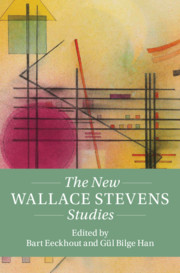Book contents
- The New Wallace Stevens Studies
- Twenty-First-Century Critical Revisions
- The New Wallace Stevens Studies
- Copyright page
- Contents
- Contributors
- Abbreviations
- Introduction That Which Is Always Beginning
- Part I Emerging Concepts in Stevens Criticism
- Part II Recent Critical Methods Applied to Stevens
- Part III Revisionary Readings of Stevens
- Chapter 12 Poetic Responses
- Chapter 13 Poetic Fiction
- Chapter 14 Poetic Thinking
- Chapter 15 Constructive Disorderings
- Chapter 16 Manner and Manners
- Chapter 17 Lyrical Ethics
- Index
- References
Chapter 17 - Lyrical Ethics
from Part III - Revisionary Readings of Stevens
Published online by Cambridge University Press: 18 June 2021
- The New Wallace Stevens Studies
- Twenty-First-Century Critical Revisions
- The New Wallace Stevens Studies
- Copyright page
- Contents
- Contributors
- Abbreviations
- Introduction That Which Is Always Beginning
- Part I Emerging Concepts in Stevens Criticism
- Part II Recent Critical Methods Applied to Stevens
- Part III Revisionary Readings of Stevens
- Chapter 12 Poetic Responses
- Chapter 13 Poetic Fiction
- Chapter 14 Poetic Thinking
- Chapter 15 Constructive Disorderings
- Chapter 16 Manner and Manners
- Chapter 17 Lyrical Ethics
- Index
- References
Summary
In the concluding chapter, Skibsrud proposes to reactivate ethical questions implicit in Wallace Stevens’s work. Building on the work of scholars like Derek Attridge, William Waters, Rachel Cole, Mara Scanlon, and others, she argues for the lyric as an actual—rather than virtual—extension of subjectivity beyond a linear narrative frame. Skibsrud emphasizes Stevens’s interest in presenting poetry as an opportunity for engagement and interpretation, while simultaneously taking seriously his emphasis on the impasse of language and subjective perception. Through close readings of several poems taken from different moments in his career, this final chapter acts both as testament to and an argument for the capacity of lyric to express the nonlinear, fundamentally poetic, relation between language and truth, self and other.
- Type
- Chapter
- Information
- The New Wallace Stevens Studies , pp. 226 - 236Publisher: Cambridge University PressPrint publication year: 2021

